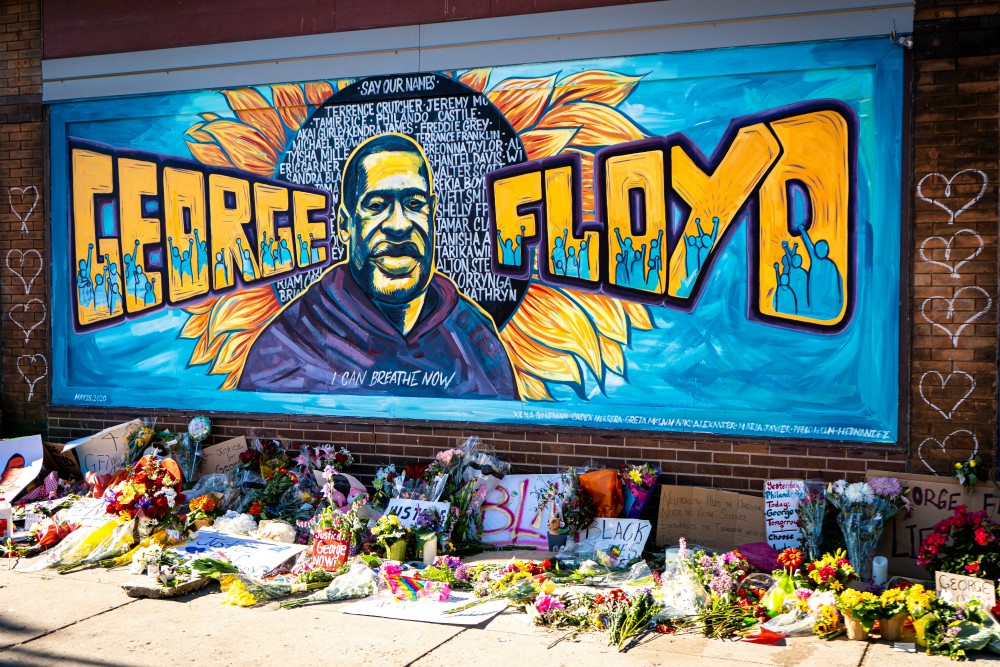
(Unsplash/Munshots)
That was a sad weekend. The words of George Floyd, "I can't breathe," rang in our ears. Another African American man murdered because of the sin of racism. The words of more than 100,000 people of the United States, "I can't breathe," also haunt our nights as we live through a coronavirus pandemic marked by the grim milestone of more than 100,000 deaths.
"I can't breathe" began 2020 with images of vast fires in Australia killing 1 billion animals and sending people to ocean waters at beaches so they could breathe. The climate change fires of California in 2019 were still fresh in our sinuses as we entered the mystery of 2020.
"I can't breathe" is felt by the thousands of immigrants detained for months and years after fleeing droughts and political violence in Central America, Africa and elsewhere. They join many who are stuck in the stale air of prisons without any chance of release or just treatment.
That sad weekend on May 31 was also Pentecost, in the Christian tradition when the "breath of the Spirit" moved through the community of disciples empowering them to good works, justice and life. Too many elements converge in this moment. No wonder we are haunted by "I can't breathe." The words strike at the very core of the meaning and future of a life of dignity, respect, and beauty.
Breath is the beginning and end of life for all humans, creatures and our beloved Earth, our common home.
The Judeo-Christian and Muslim religious traditions celebrate the beginning of life with the breath of Yahweh, God or the Holy infusing life and spirit into humans. Adam was created at a time when Earth was still void. Adam was formed from dust and Yahweh breathed "into his nostrils the breath of life" (Genesis 2:5-7).
Other traditions have teachings of life and breath. Hinduism relates, "From Him springs forth the breath of life" (Mundaka Upanishad). Every single movement in the cosmos is a movement of the vishwaprana, the cosmic breath. The Zen Master Hogen taught that the breath is all.
The Navajo people of the Southwest — who suffer with the greatest infection rate of COVID-19 in the country — believe wind to be the Holy Spirit, according to James Kale McNeley in his book Holy Wind in Navajo Philosophy. European language has no word that adequately expresses a Navajo understanding of wind, with the complex Navajo language and cosmology. McNeley says that, for example, the Navajo term Nilch'i is translated in English as "air, wind, or atmosphere," but to the Navajo it refers to "Sacred Wind, Holy Spirit, even to the Supreme Creator that pervades the cosmos and gives life, thought, speech, and the power of motion to all living things and serves as the means of communication between all elements of the living world."
"I can't breathe" is the most desperate plea for life. "I can't breathe" is a plea for another human to come to aid, to be compassionate, to stand with and act in a desperate moment.
Advertisement
Over the past months, doctors, nurses and other health professionals tried desperately to answer in every way possible the complicated "I can't breathe" message: "I can't breathe," "I may not see my children again," "I may never touch my loved one again," "I may never feel the sun on my face or hear a bird song," "I need your help as a brother or sister," "I wonder if I am ready to die in this too soon, unexpected way."
For George Floyd of Minneapolis, "I can't breathe" was a prolonged nine minutes marking centuries of suffocation by racial discrimination set in place by worldviews and systems stretching back to the 15th century and the Catholic Doctrine of Discovery. The more recent litany of police brutality, the assassinations, murders and lynchings with the purple lips of human beings witnessing to the truth, "I can't breathe."
There are many bloodstains on our souls and the soul of this nation. Desperate last words decry systems that take the breath of those who die and those who continue to live daily slow deaths under systemic oppression that controls economics, health care, justice and systems blindly keeping in place white supremacy worldviews.
For the billion or more creatures and people who find their lungs still clogged with smoke from climate-induced wildfires beyond imagining, "I can't breathe" is the cry of a planet, our common home offering one last message, plea for radical compassion and a swift change that life might be understood and honored. Climate ills are connected to racial injustice and health ills.
How far along this journey we have traveled to arrive in a moment when we are all on life support systems, intubation tubes as we continue to suffocate ourselves, smoke filling collective lungs, knees holding life down until the last gasp.
Can we hear the Pentecost words of Jesus? "Peace be with you. As the Holy One of Love has sent me, so I am sending you." Then he breathed on them and said, "Receive the Holy Spirit" (John 20:21-22).
Can we take a holy breath of air and allow it to melt ego and past hurts and pride and individual righteousness into an exhale of relief? Can we finally let go, say we have been wrong and have wronged others, and change to follow our true destiny as human beings? Can we exhale love that acts in justice and conversion and doesn't just listen? Can we hear the underlying meanings of "I can't breathe" that we share with every person and creature on the planet?
We have been hearing the last words of "I can't breathe" far too long. We have known far too long the breath of Love that infuses and invites the hard work to sustain all life each moment. We know what we must do.
[Joan Brown is a Franciscan Sister from the Rochester, Minnesota, community and the executive director of New Mexico Interfaith Power and Light working on creation care and climate justice.]







